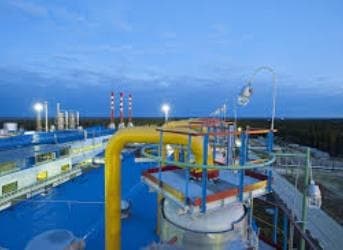Russia’s oil and natural gas state monopoly Gazprom has been offered joint venture exploration projects in Algeria, the first foreign company to be invited to work in the country. The offer was discussed at a meeting between Gazprom officials and the Algerian government earlier last week. Gazprom will participate in an international tender for the exploration and development of more than 30 prospective hydrocarbon deposits amounting to an estimated 20 percent of Algeria’s territory. Gazprom’s overseas branch, Gazprom International, is already operating in Algeria, developing al-Assel oil and gas field in the east of the country in cooperation with Algeria’s Sonatrach. Sonatrach holds the state monopoly for natural gas exports.
Algeria is Africa’s largest natural gas producer and second largest oil producer after Nigeria. Algeria joined the Organization of the Petroleum Exporting Countries in 1969, after beginning oil production nine years earlier. Algeria is currently, like the Russian Federation, heavily reliant on its hydrocarbon sector, which accounted for almost 70 percent of government budget revenue and grants and about 98 percent of export earnings in 2011.
Related Article: Lithuania Files Second Lawsuit Against Gazprom
Why Gazprom, why now? Simple - No significant exploration in Algeria has been carried out there for more than a decade, even as the country badly needs to develop new deposits to be able to fulfill its export commitments to Europe while meeting surging domestic needs. And actually, the contract is the result of eight years of negotiations.
According to the U.S. government’s Energy Information Administration, in recent years Algerian crude oil production has been stagnant even as natural gas production has gradually declined, because new production and infrastructure projects have repeatedly been delayed. Furthermore, in Algeria’s last three licensing rounds there has been limited interest from investors to undertake new oil and gas projects under the government's current terms, impelling Algeria’s Parliament recently to approve amendments to the current hydrocarbon law and introduce fiscal incentives to entice foreign companies to take on new ventures, particularly exploration in offshore areas and in areas onshore that contain shale resources.
In August 2006 Sonatrach signed memorandums of understanding not only with Gazprom, but with Lukoil as well, Russia's second largest oil company and its second largest producer of oil. Lukoil’s success has been elusive, as a company spokesman admitted that mutually beneficial joint projects have to be determined.
Gazprom has been more fortunate. In December 2008 Gazprom International received a tender for the exploration and exploitation of the onshore El Assel site.
In January 2014 Gazprom International partnered for the exploration and drilling of El Assel, with Gazprom having a 49 percent share in the joint venture and Sonatrach the remaining 51 percent.
Algeria could use the increased natural gas production. Sberbank CIB analyst Valery Nesterov said that Algeria’s reserves have remained unchanged for the past decade even as domestic consumption is growing. The imbalance between production and rising domestic consumption has reduced Algerian natural gas exports, with supplies to Europe falling 18.5 percent in 2013 to 37.9 billion cubic meters.
Related Article: Nigeria Mulls $20 Billion Trans-Saharan Natural Gas Project
But exactly how the Gazprom-Sonotrach partnership will operate remains unclear. Algeria's oil and natural gas industry is governed by the Hydrocarbon Act of 2005, which replaced earlier legislation from 1986, established terms for the involvement of international oil companies in upstream exploration and production, midstream transportation, and the downstream sector. Then, in 2006, amendments to the bill were made that reversed some of those favorable terms. In the 2006 amendments, Sonatrach was granted a minimum equity stake of 51 percent in any hydrocarbon project, and a windfall profits tax was introduced for IOCs.
In 2012, economic reality saw Algeria begin to revise the hydrocarbon law in an attempt to attract foreign investors to new projects, with Parliament approving the amendments in January 2013.
ADVERTISEMENT
If Gazprom has beaten its competition, it will hardly be smooth sailing. On 16 January 2013 al-Qaeda-linked terrorists affiliated with a brigade led by Mokhtar Belmokhtar took over 800 people hostage at the Tigantourine gas facility near Amenas, Algeria. After four days, the Algerian Special Forces raided the site, in an effort to free the hostages; at least 39 foreign hostages were killed along with an Algerian security guard, as were 29 militants, while 685 Algerian workers and 107 foreigners were freed. The Amenas gas facility attack prompted security concerns about energy companies operating in Algeria's remote areas, particularly in the south.
It will be interesting to see how Russian President Vladimir Putin, who has made battling terrorists a high priority of his administration, will respond should such a similar event occur at a Gazprom site in Algeria.
By John Daly of Oilprice.com


















